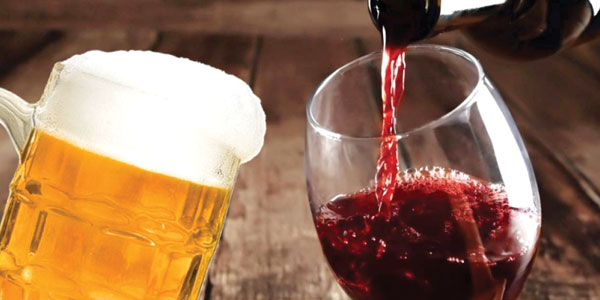
By Chara
The U.S. Public Interest Research Group recently released the results of a study that analyzed 20 alcoholic beverages and found the presence of the pesticide glyphosate, an ingredient used in weed-killing products.
Researchers stated there was no evidence of the accumulative effects of glyphosate having harmful effects on the body. However, they suggested the Environmental Protection Agency (EPA) should ban glyphosate in America “unless and until it can be proven safe.”
The study analyzed 14 beers, one hard cider and five wines, including Coors Light, Miller Lite, Budweiser, Heineken, Corona, Stella, ACE Perry hard cider, Sierra Nevada pale ale, Samuel Adams New England IPA, Peak Organic IPA, Sutter Home merlot, Beringer Founder’s Estate Moscato and Barefoot cabernet sauvignon. Peak Organic was the only beer that did not show traces of glyphosate.
“The levels we found are not in themselves dangerous,” Kara Cook, author of the study, was quoted by WebMD.com as saying. “They are well below the EPA tolerance levels. I wouldn’t tell somebody, ‘Don’t drink beer or wine.’”
In addition, the Wine Institute, an organization in California, said people should not worry about wine consumption. The study “acknowledged that the trace of glyphosate amounts detected were low,” the Wine Institute stated on its website.
Despite the study findings, Enrique Gonzalez, a craft beer enthusiast, said he plans to continue drinking beer.
“I love beer – and although this study may be right, I’m not going to stop drinking it,” Gonzalez said. “I would like to see what type of pesticides we find in our food.”
Químico herbicida encontrado en el vino y la cerveza
El Grupo de Investigación de Interés Público de los Estados Unidos publicó recientemente los resultados de un estudio que analizó 20 bebidas alcohólicas y descubrió la presencia del pesticida glifosato, un ingrediente utilizado en los productos para eliminar las malezas.
Los investigadores indicaron que no había evidencia de que los efectos acumulativos del glifosato tuvieran efectos dañinos en el cuerpo. Sin embargo, sugirieron que la Agencia de Protección Ambiental (EPA, por sus siglas en inglés) debería prohibir el glifosato en Estados Unidos “a menos que se pueda probar que es seguro”.
El estudio analizó 14 cervezas, una sidra dura y cinco vinos, incluidas Coors Light, Miller Lite, Budweiser, Heineken, Corona, Stella, sidra dura de ACE Perry, ale de Sierra Nevada, Samuel Adams New England IPA, Peak Organic IPA, merlot de Sutter Home, moscato de Beringer Founder’s Estate y cabernet sauvignon de Barefoot. Peak Organic fue la única cerveza que no mostró rastros de glifosato.
“Los niveles que encontramos no son peligrosos en sí mismos”, dijo Kara Cook, autora del estudio, según cita WebMD.com. “Están muy por debajo de los niveles de tolerancia de la EPA. No le diría a alguien: ‘No bebas cerveza o vino’”.
Además, el Instituto del Vino, una organización en California, dijo que las personas no deberían preocuparse por el consumo de vino. El estudio “reconoció que la cantidad de glifosato detectada era baja”, dijo el Instituto del Vino en su sitio web.
A pesar de los hallazgos del estudio, Enrique González, un entusiasta de la cerveza artesanal, dijo que planea continuar bebiendo cerveza.
“Me encanta la cerveza, y aunque este estudio puede ser correcto, no voy a dejar de beberla”, dijo González. “Me gustaría ver qué tipo de pesticidas encontramos en nuestros alimentos”.










